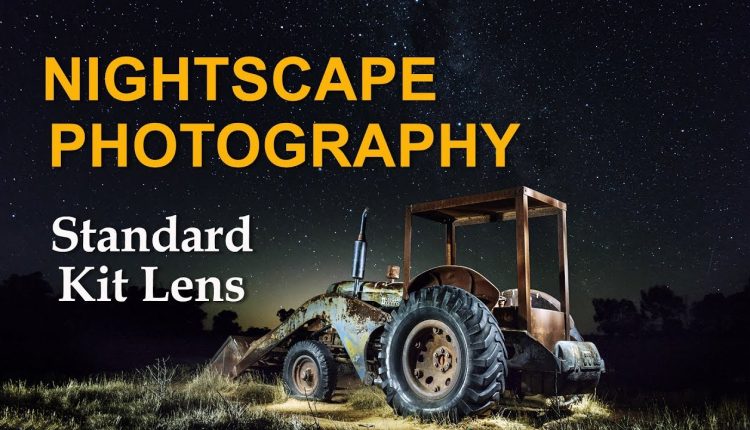Nightscape Photography with Standard Camera and Kit Lens
Today we look at shooting the night sky with a standard crop sensor camera fitted with a kit lens. As well as that we take a detailed look at the post processing of the image to get the most clarity and detail out of it.
Website:
Facebook:
Instagram:
Equipment I use:
Nikon Z6
Nikon D750
Nikon 20mm f1.8
Nikon 14-24 f2.8
Sigma 35mm f1.4
Nikon 50mm f1.8
Nikon 85mm f1.8
Yongnuo RF603nii remote triggers
DJI Mavic 2 Pro Drone
Godox Flash Equipment
LED Lenser P7.2 torch
Z96 continuous light
Syrp Genie Mini
Sky Watcher Star Adventurer
Video Equipment:
Panasonic G9 camera
Panasonic GH3 camera
Panasonic 12-35 f2.8 lens
Panasonic 14-140 f3.5
Panasonic 25mm f1.7 lens
Z96 video light
Yongnuo YN300 video lights
Sennheiser Radio Microphones

I'd like to especially thank Joe from Dark Arts Astrophotography for the use of the image at 3:10 in this video. I initially didn't realise it was his image but I think it's very important to acknowledge the original owner of material. Thanks a lot Joe for the use of your image. Check out his awesome work and a great link to his article regarding the use of crop sensor cameras vs full frame here: https://darkartsastro.ca/full-frame-vs-crop-sensor-is-full-frame-worth-the-extra-cost/
Love your work mate
Nice video. I have a d750 so not my subject. But I can see that I probably should look around you Chan for the question I do have about night photography. Which atm is light painting related. Trying to find info on if the kind of flashlight is important. Specifically in regards to color temp frequency etc. e.g. is it a good idea to go with a modern led based one or rather a halogen or…. and what power works good. To bright = Limit of creativity; to low = Problem gaging how long you need to paint an area/ exposure times ?
Meus parabéns pelo vídeo, e me tirou muitas duvidas na pós produção, assim que tiver conseguido adquirir meu equipamento vou fazer algo parecido.
Continue assim
Great!!! Which is the Program on the tablet? Thank You very Much!!
I enjoyed the tutorial, but hearing about how bad crop sensor cameras are over and over again got a little tedious. Your single shot night photo was not that bad and for a beginner photographer would be an image they could post to instagram, facebook, whatever. If i was a beginner, my reaction here would be: with hours of prep and post processing my terrible camera might make a good image. I'm not going to bother.
Excellent tutorial thanks. Do you take your images as RAW or JPEG?
Love the roo bars
As someone that has recently started to take my photography more seriously, I really appreciate this video as I too have a crop sensor camera (Nikon D3300) and a kit lens. I tried a few years ago to take some milky way photos, and they were ok, but I was disappointed overall. I can't wait to try the tricks you showed in this video. Thank you!
This was really amazing, thanks a lot! What did you use for light painting? Just the phone's flashlight?
Thank you so so much I sat watching your videos for hours yesterday and last night out it all into practise for my 1st attempt at astro photography. I'm amazed I got the shot and I love it . Yes there is improvements to be made but took all your advice downloaded sequator and wow . I'd love to be able to show it to you, is this possible? Also you mentioned an orange sheet over your torch that's my main niggle with the image, light is to white . Is it commonly available im in the UK . I can't even remember what video it was in as I watched them for about 4 hours some even twice lol. Thank you again so much .
Really cool! Thanks a lot!
Watched this video with interest, one question is as I understand it you set the focal length to 18mm but I noticed that you zoomed out the lens, does this not change the focal length. Gary Hillery
Awesome tutorial, thanks!
fake foto fake photographer :/
So one of the pictures is focused on the tractor and the other on the galaxy??
Wow what a great lesson!
Probably the best tutorial for amateur ever made. Everything is in there. Outstanding job !
wow wow how much energy you put on filming this. fantastic job! спасибо!
Excellent tutorial. Great work, thanks for sharing!
what's the app that you used to calculate focal length called?
wow what a great video.
thanks so much for showing us beginners what we can achieve with our cropped sensor and kit lenses.
and in a very easy to follow manner too.
Subbed
Thanks for the awesome video
Jeez what a lovely accent, where are you from?
@ 3:00 – 3:10 that's my copyrighted image. Permission was never asked for nor given for use of this image. Not cool to use other peoples' content without permission.
Please remove this video or I will file a full copyright claim and explore other legal recourses.